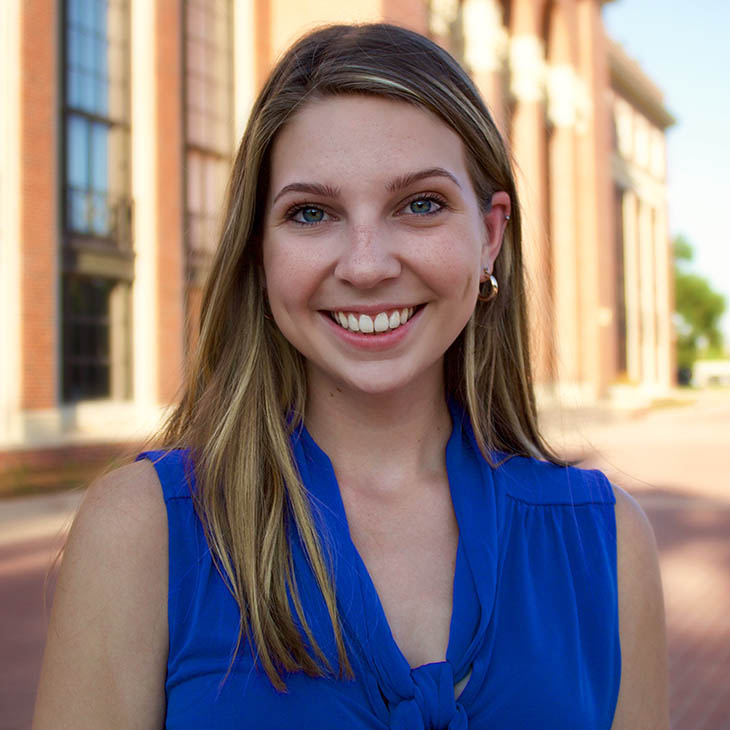
Meet Isabelle Posey: student, scholar and researcher
Thursday, September 30, 2021
Media Contact: Katie Lacey | Communications Specialist | 405-744-9347 | katie.l.lacey@icloud.com
Nutritional sciences senior Isabelle Posey completed the Centers for Disease Control (CDC) Undergraduate Public Health Scholars program, a competitive 10-week leadership program, associated with the Kennedy Krieger Institute.
The program focused on public health nutrition, and Posey learned about social determinants of health, eliminating health disparities and more while gaining experience and networking with other students and nutrition professionals. She presented posters about food insecurity at the CDC Showcase and Expo in Atlanta and the John Hopkins CARES Symposium as she concluded the experience in July 2021.
The Coweta, Oklahoma, native and Wentz Research Scholar is back on campus this fall and is leading a qualitative research study to examine the under-utilization of food assistance programs on the Stillwater campus and within the community.
Posey shared about her summer internship and her passion for nutrition and public health:
What was the process for applying and getting this opportunity and what was your interest in this internship?
I was originally looking for an opportunity to learn more about and experience public health careers. I am studying nutrition and wanted to find out how I can intersect the two. The CDC funds a series of internships called the CDC Undergraduate Public Health Scholars (CUPS) at various academic institutions. The application was composed mainly of essay questions, such as describing my past experiences, achievements, how this program will help me, and what I believe is a public health challenge my community is facing. After submitting my application, I was invited to a short structured interview with the Johns Hopkins/Kennedy Krieger Institute location focusing on Maternal and Child Health and Research Initiatives (MCHC RISE UP).
What was the most valuable thing you learned?
I learned how the social determinants of health can play into health inequities, more specifically in ethnic minority groups. I think it is very important for everyone to learn because it helps open your mind to realize that everyone is not given the same tools. Some have disadvantages based on geography or the system that they are born into. As a future health care provider, it will help look deeper for a root cause rather than treating symptoms.
How has this internship prepared you for post graduation plans?
This internship has helped me get a better idea of what a career in public health can look like and how nutrition can be a vital perspective. After graduation, I want to pursue at least a master’s and dietetic internship to become a Registered Dietitian (RD). I learned that there are many things an RD can do in public health and it has shown me many avenues that I want to explore. I am really interested in exploring nutritional epidemiology, studying distribution and finding root causes to our nation's nutritional issues, working in a community setting to help a specific community achieve better health outcomes, or working in policy to help large groups of people have access to healthy foods and safe areas to live. It showed me that my career possibilities are close to limitless! I learned many valuable lessons about professionalism, graduate school preparation, and mentor relationships. I also made many connections with peers who have similar interests and professionals who will be a part of my network for a long time.
What advice do you have for other students coming into this degree program and who may want to apply for this internship?
The advice I would give is to educate yourself on public health problems you are interested in or passionate about. This program is looking for passionate students that want to grow and become future leaders in public health, so it is important to demonstrate your passion. I think it is also helpful to have great support from faculty who are ready to encourage you and provide advice and recommendations. I would also want to encourage people from a variety of degree backgrounds to apply because anyone can get something out of this. If you have any interest in public health, you should apply. You may be surprised by all the different degrees that can be used for public health!
